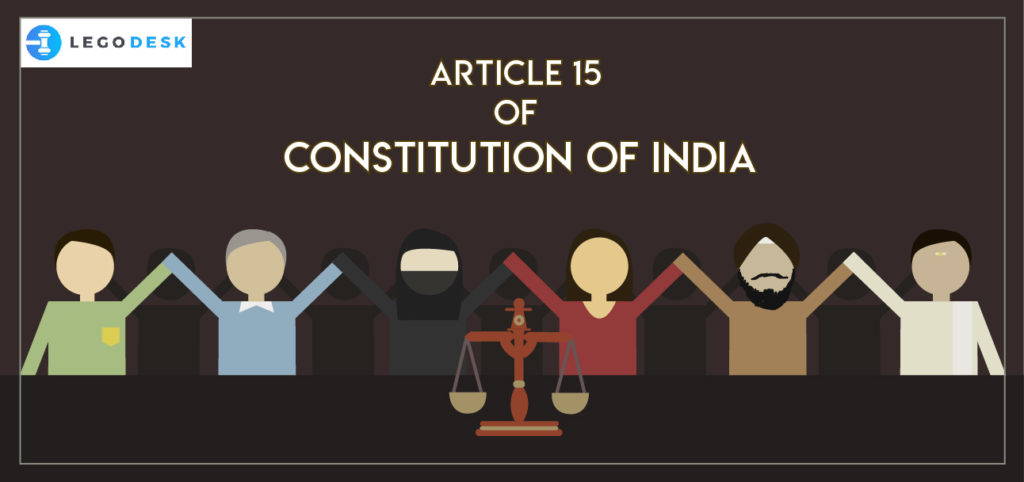Article 15 of Constitution of India

The Constitution of India, which speaks to national targets like Democracy, Socialism, Secularism and National Integration, was penned by the representatives of Indians after a broad stretch of dialogues, discussions, and deliberations. The Constitution is the supreme law of the country.
Article 15 of the Constitution of India states: “Prohibition of discrimination on grounds of religion, race, caste, sex or place of birth
(2) No citizen shall, on grounds only of religion, race, caste, sex, place of birth or any of them, be subject to any disability, liability, restriction or condition with regard to
Article 15 of the Constitution of India is accessible to citizens of India only.
Article 15 directs that the State will not oppress any subject on grounds only of religion, race, caste, sex, and place of birth or any of them. Any law separating or discriminating on at least one on these grounds would be void.
Segregation dependent on at least one of these grounds and furthermore on different grounds or grounds won't be influenced by Article 15 (1). It implies that in the event that at least one of the predefined grounds is joined with a ground not referenced In Article 15 (1); the laws will be outside the restriction contained in Article 15 (1). Article 15 (1) denies segregation or discrimination on the ground of birth and not that of residence. A State can, in this manner, grant concessions to its residents in issues of fees in an educational institution.
Case Laws
In D.P. Joshi v. State of Madhya Bharat, AIR 1955 S.C. 334, a rule of medical universities stated that for all students who are bona fide residents of Madhya Bharat, no capitation fee ought to be charged yet for non-resident students, capitation fee ought to be charged.
The validity of this rule was challenged on the ground that it negated Articles 14 and 15 (1) of the Constitution. It was held that the rule was not open to attack as infringing Article 15 (1). The ground for exemption from payment of capitation fee is bona fide residence in the State.
Residence and place of birth are two different concepts with various meanings both in law and fact. Article 15 (1) forbids separation/discrimination on the ground of place of birth yet not on the ground of residence.
Also, the necessity of a test in the regional languages for State employment does not contravene Article 15, as a test in the regional language for State employment is mandatory for all people looking for employment. It has been held so in P. Raghunandha Rao v. State of Orissa AIR 1955 Orissa 1131.
In Air India v. Nargesh Miija, AIR 1981 S.C. 1829, the Supreme Court struck down Regulations 46 and 47 of the Air India and Indian Airlines. Regulation 46 gave that an air-hostess will resign from the service of the organization after attaining the age of 35 years or on marriage on the off chance that it happens within 4 years or on first pregnancy whichever is prior.
Under Regulation 47, Managing Director had the discretion to extend the age of retirement by one year at the time up to the age of 45 years, if the air-hostess is found medically fit. The court held that termination of service based on pregnancy is unfair and clearly violates Article 14. The power of managing director for the extension of the age of retirement is likewise unconstitutional.
Article 15 (2) applies to States and in addition private actions while Article 15(1) alludes to the obligation of the States only.
Clauses (3) and (4) of Article 15 embodies special case or exemption to the general standard articulated above. They enable the State to make special provisions for ladies and kids and for the advancement of any socially and educationally backward castes of citizens for the Scheduled Castes and Scheduled Tribes.
In M.R. Balaji v. State of Mysore, AIR 1963 S.C. 649, the government reserved seats in the Medical and Engineering schools in the State as below:
In backward castes 28%; more backward classes 22%; Scheduled Castes and Tribes 18%. The court held that the sub-grouping made between backward castes was not justified under Article 15 (4). Caste isn't the sole criteria for deciding backwardness. Reservation up to 68% is a "fraud on the Constitution". Article 15 (4) just empowers the State to make special provision and not exclusive provision for the backward castes.
In-State of Madhya Pradesh v. Nivedita Jain, AIR 1981 S.C. 2045, the Supreme Court upheld the validity of an executive order of the Government of Madhya Pradesh by completely relaxing the requirement of qualifying marks for the applicants of Scheduled Castes and Scheduled Tribes in Pre-Medical Tests.
The court saw that without any law to the contrary, it is open to the government to force such conditions which would make the reservation effective for the advancement of candidates of such classes.
The court held that the executive order totally relaxing the minimum qualifying marks was not a violation of the Regulation and Article 15 (4) of the Constitution.
In Mandal Commission case, the Supreme Court by a majority of 6-3 has held that the sub-grouping of backward castes into more backward castes and backward castes for the reasons of Article 16(4) can be made. Yet, because of sub-order, the reservation can't surpass over 50%. The distinction ought to be based on degrees of social backwardness.
This piece aims to inform the readers about the meaning of article 15, the purpose of Article 15 and also state the various landmark judgments related to article 15.
Try our Debt Resolution solutions today Request a Demo